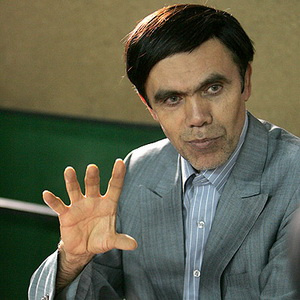China’s Security Council Presidency and Iran’s Nuclear Program
By Ali Khorram, foreign affairs analyst

In January 2010, the interim chairmanship of UN Security Council will be conferred to People’s Republic of China. Three sanction resolutions against Iran have been recorded in council’s profile, but on Tuesday, Zhang Yesui, China’s envoy to the United Nations told the reporters that it is not the right time for sanctions since diplomatic efforts "need more time and patience".
Ali Khorram, Tehran University professor and foreign affairs analyst believes that:
Chinese have generally been in good terms with Iran. With their ever-growing need for energy, the Chinese never wish to see the Persian Gulf region in turmoil and have been quite careful not to hurt the feelings of Iran or any other oil-producing state. China’s record shows the country has followed the same attitude in UN affairs. This is a part and parcel of China’s strategy in the 21st century. The country obviously frowns at any decision which leads to imposition of further sanctions against Iran. But if asked whether China’s interim chairmanship on UN Security Council will have an impact on sanctions against Iran, may answer will be a no.
In a term of office that expires after one month, China administers the council in January, a month with the least possible activity due to New Year holidays of Christian countries. Moreover, it takes more than one month for UNSC members to convene for discussion and release of a resolution against Iran. No certain decision regarding Iran’s nuclear program will be made in January. The only relevant occasion may be holding a preparatory session to discuss another resolution.
Instead of cherishing hope during China’s term, Iran should be aware of February, when France, with enough motives to act against Iran, will be holding the chairmanship. It is February, and not January, that can determine the future of Iran’s nuclear program.
Will the sanctions be effective? The question depends on the circumstances inside Iran. Post-election protests have made Iran vulnerable, so chances are higher that external pressures affect the situation. However, there are signs of upcoming internal developments which can neutralize the impact of sanctions. The most dangerous factor against Iran in near future is France that will do its best in January preparatory session to pave the way for a decision against Iran in February.
Ali Khorram, Tehran University professor and foreign affairs analyst believes that:
Chinese have generally been in good terms with Iran. With their ever-growing need for energy, the Chinese never wish to see the Persian Gulf region in turmoil and have been quite careful not to hurt the feelings of Iran or any other oil-producing state. China’s record shows the country has followed the same attitude in UN affairs. This is a part and parcel of China’s strategy in the 21st century. The country obviously frowns at any decision which leads to imposition of further sanctions against Iran. But if asked whether China’s interim chairmanship on UN Security Council will have an impact on sanctions against Iran, may answer will be a no.
In a term of office that expires after one month, China administers the council in January, a month with the least possible activity due to New Year holidays of Christian countries. Moreover, it takes more than one month for UNSC members to convene for discussion and release of a resolution against Iran. No certain decision regarding Iran’s nuclear program will be made in January. The only relevant occasion may be holding a preparatory session to discuss another resolution.
Instead of cherishing hope during China’s term, Iran should be aware of February, when France, with enough motives to act against Iran, will be holding the chairmanship. It is February, and not January, that can determine the future of Iran’s nuclear program.
Will the sanctions be effective? The question depends on the circumstances inside Iran. Post-election protests have made Iran vulnerable, so chances are higher that external pressures affect the situation. However, there are signs of upcoming internal developments which can neutralize the impact of sanctions. The most dangerous factor against Iran in near future is France that will do its best in January preparatory session to pave the way for a decision against Iran in February.

